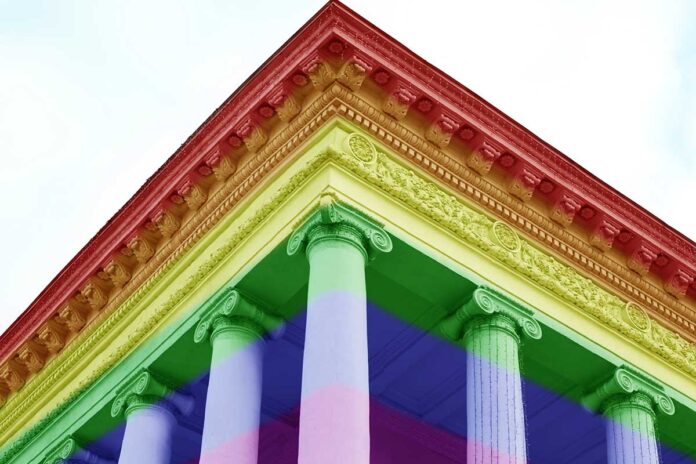This year is on track to set a record for anti-LGBT+ legislation. A mere three months into 2022, the American Civil Liberties Union (ACLU) reports that 238 such bills have already been proposed in state legislatures, a rate of more than three a day. Limiting the rights of trans youth is a focal point of about half of these bills.
According to an NBC News analysis of data from the ACLU and the LGBT+ advocacy group Freedom for All Americans, about 670 anti-LGBT+ bills have been filed since 2018, with the number of bills increasing each year.
According to the data, there were 41 bills in 2018, just over 60 in 2019, nearly 150 in 2020, 191 in 2021 and now 238 bills in fewer than three months this year.
The range of bills include policy proposals that would limit school curricula, as in the Florida “Don’t Say Gay” bill, or ban books with LGBT+ information. There are also bills that would allow religious exemptions with regard to anti-discrimination laws, as the foster care case in Philadelphia that was decided by the U.S. Supreme Court in 2021, as well as the case of a designer who won’t make same-sex wedding websites. Other bills would either limit or ban trans people from playing sports on teams in line with their gender identity, using bathrooms that correspond with their gender identity or receiving gender-affirming health care.
As witnessed during the contentious Senate Judiciary hearings for Ketanji Brown Jackson, who has been nominated to the Supreme Court, those promoting such bills assert they want to protect children and preserve parental rights and religious freedoms. That messaging was dominant in the questioning by Republican senators during the hearings.
But LGBT+ advocates assert that the volume alone of these bills is concerning. Chase Strangio, deputy director for transgender justice at the ACLU LGBT & HIV Project, told NBC News, “It’s important for people to pause and think about what is happening — especially in the health care context — because what we’re seeing is that the state should have the authority to declare a population of people so undesirable that their medical care that they need to survive becomes a crime.” Strangio added, “What more terrifying intrusion of the state could there be?”
Yet as The Washington Post reported a month ago in a data analysis by R.G. Cravens, an assistant professor of political science at California Polytechnic State University and a public fellow in LGBTQ rights at the Public Religion Research Institute in Washington, D.C., new polling shows a record number of Americans now identify as LGBT+.
Cravens wrote, “Gallup reported that a record 7.1 percent of the U.S. population identifies as LGBT, or otherwise does not identify as heterosexual. It finds the number in older generations holding steady, while the biggest increase is among Generation Z (people born from 1997 through 2003). One in five people in this group now identify as LGBT. Given that LGBT voters were among those who helped decide the 2020 election for President Biden, what does this news mean for LGBT political power?”
That last query may be the pivot for many of these bills. The midterms and 2024 presidential race are looming, and with an economy making significant recovery under Biden and the impact of Covid-19 lessening and mandates ending, the GOP is returning to focusing on culture wars issues to mine voters. The recent focus by conservatives on Lia Thomas, a symbol of trans athletes, has highlighted how trans rights are becoming flashpoints and wedge issues for the right.
In addition, religious exemptions and religious freedom issues have become a significant focus in anti-gay legislation specifically. Sen. John Cornyn (R-TX) spoke at length about religious objections to same-sex marriage during his questioning of Judge Ketanji Brown Jackson in the confirmation hearings, even though the Supreme Court legalized same-sex marriage in 2015.
Yet repeatedly, as PGN has previously reported, the Supreme Court has found in favor of religious freedom with regard to LGBT+ cases.
Still, popular opinion has begun to trend in favor of LGBT+ rights. On March 17, a Public Religion Research Institute (PRRI) survey showed “more Americans than ever now support rights for LGBTQ individuals, according to a large new survey of more than 22,000 adults conducted by the PRRI.”
According to the study, nearly 8 in 10 Americans, or 79 percent, support laws that protect LGBTQ people from discrimination in jobs, housing and public accommodations. The survey also noted that nearly 70 percent of Americans support same-sex marriage, up from 54 percent in 2014.
A key data point in the NBC News analysis of the ACLU and Freedom for All Americans data found anti-trans policies were increasing exponentially. In 2019, 22 of 60 anti-LGBTQ proposed bills, or 37 percent, were anti-trans bills. But in 2021 that percentage rose 80 percent (153 of 191) of anti-LGBTQ bills. In 2022, 65 percent of the 154 anti-LGBTQ bills filed as of March 15 were anti-trans bills.
The Washington Post analysis by Cravens noted: “Gallup speculates the increase in LGBT identification reflects a shift in acceptance among the general population. That is, more LGBT people feel comfortable identifying as such because they feel accepted by society.”
But the analysis also asserted, “It is true that attitudes toward LGBT people have improved since the 1970s; however, attitudes toward transgender people are not as positive as attitudes toward the other three groups in the acronym. Attitudes are also mixed about specific policies like bathroom access for transgender people and religious exemptions to civil rights laws — for instance, whether a bakery can refuse to supply a cake for a same-sex wedding.”
As the Senate hearings clarified, the GOP is just warming up, not backing down, on these anti-LGBT+ policies and rhetoric.
